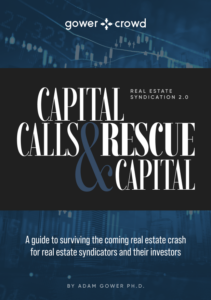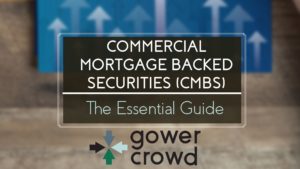2021 Real Estate Crowdfunding Statistics And Trends
Real estate investments, once considered an alternative asset class, are growing in popularity as investors look for ways to de-risk and diversify their portfolios. One of the ways they are doing so is by investing in real estate crowdfunding. Online crowdfunding platforms make it easy for investors to browse and compare deals at their own leisure, comparing investment opportunities side-by-side using similar metrics.
Real estate crowdfunding has become increasingly popular since changes were made to SEC regulations that now allow both accredited and non-accredited investors to invest in real estate deals using these online platforms. Today, someone can invest as little as $100 into a deal. This sort of flexibility allows first-time real estate investors to whet their appetite without making a big or long-term commitment.
In today’s article, we look at the most prominent real estate crowdfunding statistics and trends in 2021.
Related: What is Real Estate Crowdfunding?
The Four Main Types of Crowdfunding
Historically, when people have thought of “crowdfunding,” they have thought of it as donation-based or reward-based crowdfunding. These are instances in which someone donates to fund a product or a cause, or alternatively, invests in a product or cause in exchange for a nominal reward. These are just two types of crowdfunding.
Donation-based and reward-based crowdfunding are rarely used in real estate crowdfunding.
Instead, real estate crowdfunding usually takes one of two alternative forms: equity-based or debt crowdfunding.
Equity-based crowdfunding is when someone invests through an online platform, like RealtyMogul or Fundrise, in a specific real estate deal or fund. In exchange for their capital investment, they obtain an equity stake in the project. They hold shares as a limited partner, just as they would if passively investing with a sponsor through traditional (offline) syndications. Real estate crowdfunding is simply a way of moving this process online and in front of a larger audience. Crowdfunded equity may represent a portion or all of the equity used in a real estate transaction.
An alternative to equity-based crowdfunding is to invest in real estate debt through an online crowdfunding platform. The process is similar to investing in equity-based deals, but instead of investing equity as an LP shareholder, you are investing in the debt needed to finance the transaction and/or building improvements. Debt investors are usually repaid prior to equity investors, and accordingly, should expect to earn a lower return on their investment compared to those who invest in equity-based crowdfunding.
Need more capital for your real estate investment? Gower Crowd helps professional real estate investors exceed their capital goals online. Contact us today to learn more.
Top Players in the Market
As federal regulations have changed, and now that both accredited and non-accredited investors can invest in crowdfunded real estate deals, many more players have entered the market. Some of the most recognized real estate crowdfunding platforms include RealtyMogul, Fundrise and Crowdstreet. However, there are many others competing for market share. Cadre, BrickFunding, and American Homeowner Preservation continue to grow their online presence and are expected to have exponential growth in 2021.
Each of these platforms is unique in its own way. For example, while RealtyMogul, Fundrise and Crowdstreet are focused primarily on commercial deals, American Homeowner Preservation is geared toward crowdfunding investments in distressed residential properties. Meanwhile, BrickFunding is an aggregator of deals offered through other crowdfunding platforms, which allows investors to easily shop around for investment opportunities of all kinds.
Statistics of the Global Crowdfunding Market
Globally, crowdfunding continues to grow in popularity. The global crowdfunding market size was $84 billion in 2019 and is expected to reach $114 billion in 2021. Real estate accounts for only a fraction of these investments—consumer products and other goods are included in these numbers, as well.
The global real estate crowdfunding market was estimated to have reached $8.3 billion in 2020. According to a new research study titled “Real Estate Crowdfunding Market by Investors (Individual Investors and Institutional Investors) and by Property Type (Residential and Commercial: Global Industry Perspective, Comprehensive Analysis, and Forecast, 2018-2027,” North America represented 40 percent of these investments, followed closely by Europe with 33 percent. The study estimated that the global real estate crowdfunding market will reach $13.6 billion by 2027, representing a growth rate of roughly 9 percent during this time.
Latin America accounts for only 4 percent of real estate crowdfunding investments; the Middle East is nearly half that at just 2 percent of all deals. The study suggests that the expansion of real estate crowdfunding in these markets could bolster the economies of developing countries.
Statistics of Crowdfunding Campaigns
Based on our own internal research, in 2020, an estimated 60,000 individual investors participated in real estate syndications offered through real estate crowdfunding platforms and independent sponsors raising money directly from investors. Many more investors have registered with crowdfunding platforms, even if they have not yet invested. For example, RealtyMogul boasts access to private market offerings for its 200,000+ investors registered with the platform. Fundrise claims to have over 130,000 active investors, as well. There is likely some overlap among investors, with many investors registering with multiple platforms to ensure access to a wider swath of deals.
The median real estate offering was $7.035 million in 2020. [Source, proprietary GowerCrowd analytics]. Typically, passive investors accounted for 80 to 95 percent of the capital raised for these deals; the sponsor would round out the capital investment by contributing the remaining 5 to 20 percent of equity needed to finance the transaction.
From our experience working with sponsors, we see the major rush to invest in online offerings, results in 42 percent of funds being raised in the first and last three days of a fundraising campaign.
In a study we conducted together with IMS, we discovered that sponsors offered a preferred return ranging from 0 to 22 percent (outliers), with 40% of sponsors offering an 8% preferred return, 30% offering 10%, 8% offering 7%, 9% and 10% being the next most commonly found, and the remainder being the outliers.
Related: Interesting Facts You Didn't Know About Real Estate Crowd Funding
Trends in Global Crowdfunding
As crowdfunding campaigns begin to enter the mainstream, more people are expected to use online platforms to raise money for their projects. This is particularly true among younger sponsors, who are more comfortable using online technology and who are less engrained in the traditional methods of raising capital. These sponsors will look to connect with other young investors, as the average crowdfunding investor is over 35 years old, according to our internal research, primarily because of the accreditation standard set down by the SEC that requires a certain income or net-worth level that does not generally occur in a younger population.
In the U.S., regulation crowdfunding, a popular method of avoiding registration requirements for securities-based crowdfunding projects, is gaining significant traction – a trend we continue to see in the months and years to come. Crowdfunding deals raised $51 billion [Proprietary GowerCrowd analytics] since inception in 2012/3 through year end, 2020 and the number has been growing each year, with more being raised every year.
To date, the “residential” real estate category has accounted for more than 50 percent of crowdfunded deals, according to FNF Research. We expect to see a shift toward commercial property, as more investors are starting to see crowdfunding as a way to access bigger, more lucrative deals with limited funds. Sponsors are now opening the door for individuals to invest in projects that were once only available to the likes of institutional investors. Crowdfunding will not replace the role of institutional investors, but rather supplement their role: for example, a sponsor may raise 15 percent of the equity needed for a deal from an institutional partner, and then crowdfund another 5 percent through individual investors.
Looking to raise more capital for your real estate projects? Gower Crowd can help your syndication crowdfund investments and raise unlimited capital online. We leverage decades of experience in helping like-minded investors meet their wealth goals.
Final Thoughts
Real estate crowdfunding has been on the rise for some time now, a trend that we expect to see continue well into 2021 and beyond. As the economy improves and life gets back to “normal,” people will be looking to deploy pent-up capital in investments of all kinds. This bodes well for real estate, generally, and crowdfunding real estate specifically – as more people turn to online platforms to begin their real estate investing journeys.
Any investors considering real estate crowdfunding will want to do their homework first—not only on the deal, but also the sponsor and the platform offering the deal. Some platforms have a proven track record, while others are only now emerging and still in their infancy. There is some risk associated with investing in an unknown platform, so be sure to understand both their fee structures as well as what recourse you will have if that platform goes under.
We will continue to monitor real estate crowdfunding trends in 2021 and beyond; stay tuned for more as this niche market evolves.
Related: The SEC Announces Latest Changes to Benefit Real Estate Investors
If you liked this article and would like to learn more about raising capital for real estate investing, check out some of the resources below:
If you have only just started in real estate development, have completed no deals, have no email list, but know you want the freedom and wealth being a real estate developer brings, then I suggest your first step is to start evaluating deals so you can recognize a good one when you see it.
Here’s where you should start. You’ll learn everything you need to know – the different types of real estate, different development strategies, how real estate cycles influence the market, and all about due diligence.
If you want to find deals and raise money for them so you can start your real estate development business, then learning how to conduct due diligence so you can pitch your deals better to investors is a great place to start.
If you’ve already purchased one or more real estate project and are seeing more opportunities than you can finance, then now is the time to start building your investor network so you can finance all your next deals quicker.
You’ve already got some momentum; now start finding and educating prospects about what you’re doing so you can build an email list of people to pitch to when you’re ready to raise money for your next deal.
This is what we build for private clients all the time – it’s called the Investor Acquisition System and you can access the entire program right here so you can find prospects, and convert them into being deep pocketed, repeat investors in your deals.
If you are a seasoned pro with multi-cycle experience, a substantial portfolio, a decent deal pipeline, and find yourself spending too much time raising equity capital because you’re still doing it in-person, then it’s time you put technology to work for you.
The wonderful thing about doing this is that you’re not going to be doing anything different than you’re already doing and, guess what, you’ll never have to sit through investor meetings again.
Sounds crazy I know, but I lay the whole thing out for you in this white board workshop where I personally show you exactly what it takes for you to transform your equity raising into a fully automated, capital raising machine so you can find new investors while increasing commitments from your existing network.
RELATED ARTICLES





